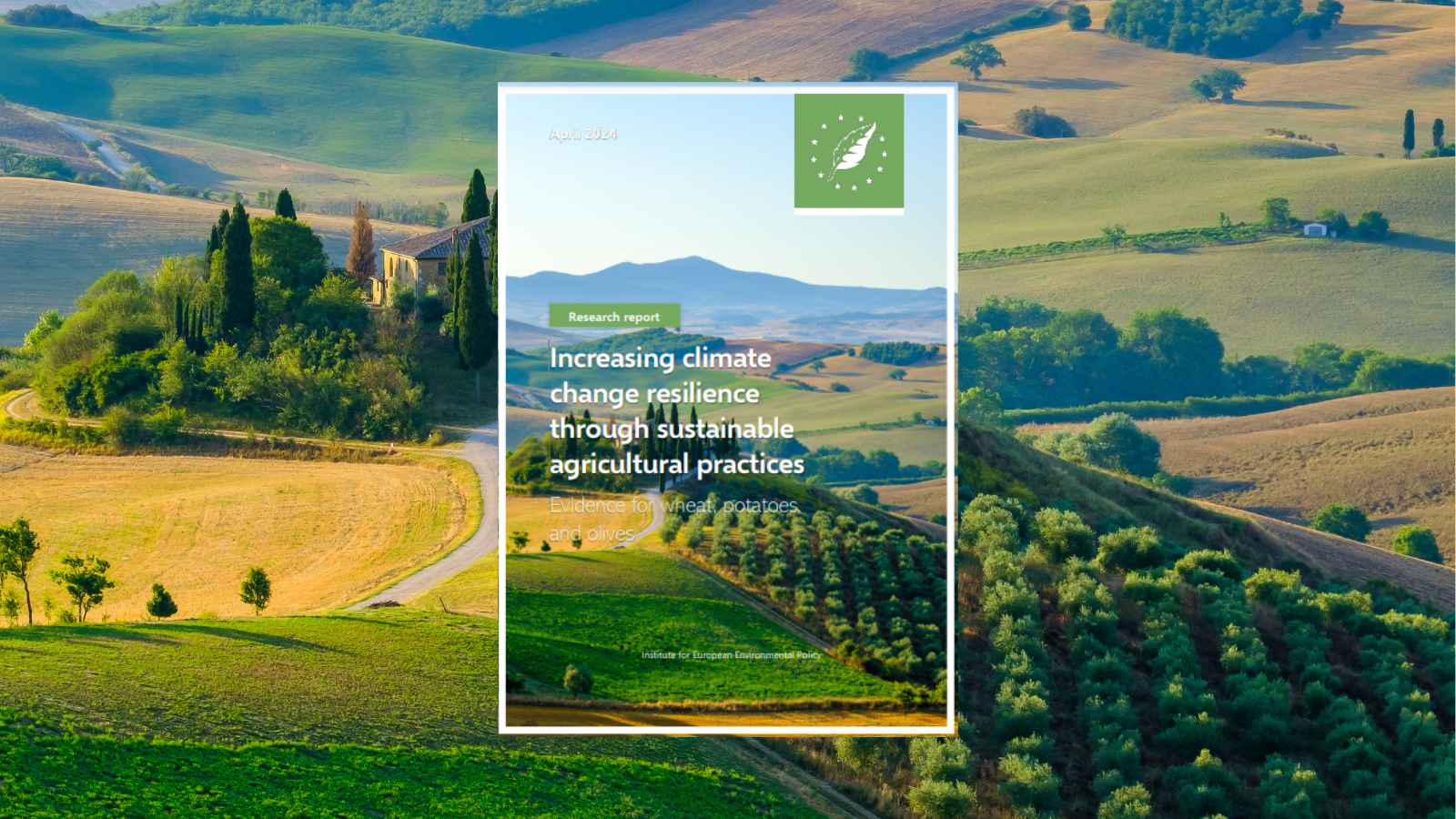AUTHORS: Melanie Muro, Robin van Dijk, Axel Godfroy and Elisabet Nadeu (IEEP)
Building up the resilience of farming systems requires implementing short- and long-term climate adaptation strategies at different scales. At the farm level, sustainable cropping practices may ensure that crop production is robust enough to buffer against and adapt to current future climate change risks. By analysing existing research into the effects of sustainable practices on soil, water and biodiversity parameters, we offer insights into their potential to increase the resilience of wheat, potatoes, and olives production, three key products of EU agriculture.
Climate change is happening. The year 2023 was characterised by contrasting extremes which demonstrate this: heavy rains in springtime caused flash floods in many European regions, the Mediterranean suffered under extreme heat and wildfires during the summer, and in September torrential rain and floods devastated Greece, Bulgaria, and Turkey, while much of Northern Europe saw heavy winds and flooding in October.

Whilst all economic sectors will be, and already are, impacted by climate change, agriculture is considered particularly vulnerable. The European Union is one of the world’s largest producers and exporters of agricultural products, with a large share of the food produced prepared and eaten in kitchens around Europe. In recent years, the EU output of many key agricultural commodities fell sharply due to widespread droughts and other adverse weather conditions.
Without measures to mitigate and adapt to climate impacts, farmers might be forced to switch to alternative crops. In the long run, this could change what and how we farm in some European regions and reshape our national cuisines. Yet, food is more than nourishment: it is central to European national identities and its culinary diversity. By making agricultural production in Europe more resilient to climate change, we will ensure that farming continues and contributes to preserving Europe’s diverse regional cuisines.
Building up the resilience of farming systems requires that short- and long-term climate adaptation strategies are implemented at different scales, drawing on a full range of knowledge, financial, technical, cropping actions, and practices. At the farm level, several sustainable cropping practices, i.e., crop sequencing, arrangement, and management techniques, can ensure that arable crop production is robust enough to buffer against current climate risks and adapt to future climatic conditions. These practices can potentially maintain and improve the state and function of natural resources that farming relies on, which are systematically degraded by the continued use of conventional methods, such as intensive tilling, leaving soils bare, or high chemical inputs.
Against this background, this report examines the impacts of different climate risks on three major agricultural crops, which are staples of European cuisines: wheat, potatoes, and olives. It reviews the available research into the effects of sustainable cropping practices on biodiversity, soil quality and water parameters, which are considered crucial determinants of climate change resilience of farming systems.
The analysis of the evidence for wheat, potatoes, and olives finds that sustainable cropping practices can potentially maintain and improve biodiversity and soil and water parameters that can buffer farming systems against current climate risks and help them adapt to future climatic conditions. Importantly, the evidence suggests no significant negative impacts on crop outputs when compared to conventional farming methods.
The study concludes with recommendations for policy-makers, researchers, and practitioners. First, it is essential that steps be taken to support farmers and households engaged in agriculture to cope with both the threat of climate variability and the challenges that climate change will pose to future livelihood opportunities. Climate change is not a singular event. Policy instruments should focus on facilitating a wider uptake of practices that improve soil quality, water conservation, and landscape and biodiversity parameters that will potentially enhance the climate change resilience of farming systems.
Second, countries should use the flexibilities provided under the current CAP to design interventions that incentivise farmers to take up those practices that have proven to increase resilience to the specific climate risks projected to affect their region. This type of targeted support is especially needed to help farmers with up-front investment needs to transition to new agricultural methods.
Third, the evidence demonstrates that the positive effect of practices on parameters which enhance resilience and yields depends on a wide variety of factors and is context-specific. Farmers may lack knowledge regarding the suitability of different practices and their implementation under specific pedoclimatic conditions. etc. Hence, Member States need to support farmers in developing tailored plans for improving sustainability and resilience and investing in increasing their advisory capacity. Knowledge-sharing platforms and workshops may help to facilitate farmer-to-farmer dissemination of know-how on sustainable practices that are relevant to their circumstances.

Finally, identifying the most appropriate practices for different environmental and (current and future) climatic conditions warrants further research.
The report is complemented by three factsheets showcasing how sustainable cropping practices have been successfully implemented in practice in Germany, France and Spain.
- Increasing climate resilience – Growing potatoes using regenerative agriculture
- Increasing climate resilience – Growing intercropping wheat in France
- Increasing climate change resilience – Sustainable management of olive groves in Spain
Images by Emre and Nicolas Barbault on Unplash.
This work was commissioned by the European Climate Foundation.


